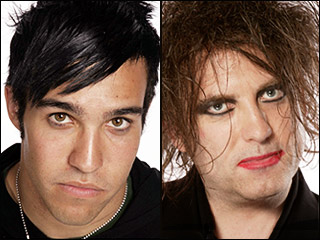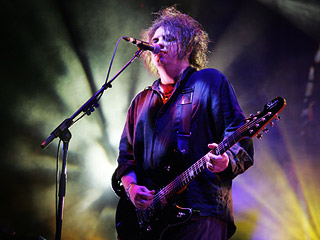Interview - Idol Chatter

December 1, 2006 - EW (USA)
Interview - Idol Chatter

Idol Chatter


PETE WENTZ (27; Fall Out Boy): I remember once my band played on the side stage of something that the Cure were performing at, and afterwards I followed you onto an elevator and went to whatever floor you got off on... and I didn't say anything to you. I had a plan to tell you that your music changed my life, but instead I just stayed on the elevator. I imagine people walk up to you all the time and tell you that your music changed their lives.
ROBERT SMITH (47; The Cure): You'll be amazed how many people don't say that.
WENTZ: One thing I'm really interested in is how you've managed to stay completely relevant for the past three decades, and what you think is more important: changing with the times, or maintaining your artistic vision.
SMITH: It's essential to me to continue what I do [artistically]. The idea of appealing to people of a like mind and like spirit always appealed to me.... When I was younger, I never just wanted to play to people who were my own age, and as the years have gone by, the Cure's audience has remained very broad. I never wanted to grow old with the audience. How we've managed it is just continuing to do what we want to do. We've been irrelevant to a lot of the media for a long time, but to the people that we matter to, we've been relevant for a long time.
WENTZ: One of the things that always appealed to me is that you never wrote down to an age group. I got into it when I was 14, and I'm just as into it now at 27.
SMITH: It's truly music — writing songs as [you'd write] literature, writing what you know...The problem as you get older is, from my perspective, after a certain amount of songs, you tend to start writing something and then you stop and say, ''Wait, I think I've written that before.''
WENTZ: Another interesting thing that I've noticed in the past two or three years is a lot of bands that have come out have assumed this dark [persona]. Did you start out that way?
SMITH: [Initially] I wanted to be a pop group... [But] when you first start out, you have to play and play and play... [and] we went down a pretty dark path. [Eventually] I thought, ''The only way to make this fun again is to make it fun again'' — and so we became a pop group again. It's a balancing act. But I never wanted to be a band that made the same type of music. You don't always have to sing dark things to be thoughtful... I get very frustrated with people who classify bands very early only as, They do only this. I think it's really crass.
WENTZ: People now say to us, ''What is this emo thing? Is it about to be over?'' And people think that everyone is making an industry out of misery now... I think that people need to classify things in order to try to understand them. Whatever people want to classify us as, they can...But to have a career like the Cure's is awesome — to have these amazing moments and at the same time to have this fanbase that stays with you this entire time.
SMITH: We've always been classified as a goth band. But as long as your audience really believes in you, it doesn't matter what other people label you.... With your band, I bought your first CD for one of my nieces. I remember thinking, ''This has so much energy in it.'' Some of your songs are really, really good lyrically and musically. And you're involved in so many more different things, whereas with the Cure, [the band] was all we did. Yet you have books and your record label...I resisted always going further than just a band.
WENTZ: We're at that early stage where bands are fiercely competitive with each other, and when another band gets an award we see it always as a shot at ourselves. How important were the other bands in the scene at the time?
SMITH: When Simple Minds got on Top of the Pops and when Echo & the Bunnymen [were doing well], I remember thinking, ''We're going to be the band that's left behind,'' which is quite funny, because as it turns out, we weren't. But that's a natural part of any artistic field. Even if you've got your head down, doing exactly what you want, you can't help but occasionally look up and around.
WENTZ: You've mentioned that you are a private person... but you still have this very ravenous fan base who are trying to get in your head. How do you comes to terms with that, and how have you dealt with it over such a long period?
SMITH: We're lucky in that Cure fans are generally really nice people. I suppose every band is obliged to say that, but it's actually true with us.... [And] it comes with what I do. If I suddenly turn around and say, ''Why do all these people want a part of me?'' that would be pretty naive. I can't have it both ways: I can't sing my heart out and write songs and expect people to be interested, but only up to the point that I want them to stop. But generally, Cure fans respect the idea that I'm not playing at wanting to be quiet. I do [want to be quiet]. When you first start a band, it should be your whole life — but if it's still your whole life at 30 years down the line, you're not going to be writing very good songs. You need to get out in a different way. In a band, you experience an incredible amount. The more success you get, the more insane it gets. But if that's all there is, it's really quite tedious after a while. Eventually, the boring things become the exciting things. You get back off a four- or five-month tour and you find that making a sandwich becomes really, really intense.
WENTZ: Totally. I had this girlfriend for many years, and when I would come back from a two-month tour, one of my favorite things to do would just be to sit on a bed and watch a DVD.
SMITH: Yeah, no one's going to knock on the door and tell you to be ready in 10 minutes.
WENTZ: You're obviously an idol of mine. Who did you look up to when you were just starting out?
SMITH: I suppose David Bowie. In fact, I did something similar to this with him in the '90s, where a London radio station would have people interview their heroes. I interviewed Bowie, and I got incredibly drunk before it and started arguing with him. It was one of the most awful days I've ever had in my life. Weirdly, though, a couple of years later, he had his 50th birthday at [Madison Square Garden], and I was the only British artist that he asked to duet with. That was one of my best moments — one of my lifelong ambitions. When the glam thing started, it was such a big deal; it polarized everyone at school... I suppose what appealed to me even at that young age was how individual he was, that I don't give a f--- look.
WENTZ: I was watching South Park maybe a year or two ago, and I remember thinking, That might actually be Robert Smith's voice! But I wasn't sure. I thought it was amazing, because these are two things that I really love, but I remember thinking, This is an arena that I would never see Robert Smith in. That was you, right?
SMITH: Yeah. It's weird because I had only seen a couple of the early South Parks. [Creators Trey Parker and Matt Stone] sent me a couple of episodes on video and I pissed myself laughing. I stayed up all night and went into this radio station and recorded my words down a phone line. I had no idea what it was all about. I had one of them on the other end of the line directing me, saying, ''Please sound more like Robert Smith. Come on!'' About six months later I saw it and I was completely thrown by what they had done with it. It was great. When I'm walking off and Stan's saying, ''Disintegration is the best album ever,'' it's one of my greatest moments in life.
WENTZ: Over the years I've always found myself sending people that I loved Cure songs, because they are love songs, but many of them are from such a different perspective — like ''Why Can't I Be You,'' which borders between love and obsession. When you play the older songs now, do they still mean the same thing as they did when you first wrote them? Or do you think, ''That was a snapshot of my life 10 years ago and I don't really feel the same way anymore''?
SMITH: When you're on stage, the real world just drops away for that time. It's pretty intense. Sometimes I'll pick a couple songs we haven't done for a while just so that I can relive that moment... and with most of them, I'm taken back to that time and that place. It can be quite odd, at the end of that song, to suddenly snap back into reality and think, ''S---, that was 20 years ago.''
WENTZ: You've had giant pop hits and these cult favorites. Did it bother you at times when certain songs would be gigantic?
SMITH: We had such an awful long time to get well known. [When] it happened, though, I found it very uncomfortable. For a long time, I didn't like certain songs because I thought, ''You're to blame, you bastard. You made me popular.''
WENTZ: Like ''Friday I'm in Love''?
SMITH: Yes, that's a perfect example. We did an album in '96 [Wild Mood Swings] and we had a song on there called ''Mint Car'' — it was the single, and I thought it was a better song than ''Friday.'' But it did absolutely nothing because we weren't the band at that time. The zeitgeist wasn't right. It taught me that sometimes there's a tipping point, and if you're the band, you're the band, even if you don't want to be, and there's nothing you can do about it.
(Posted:11/22/06)